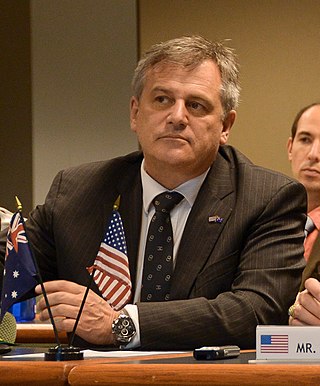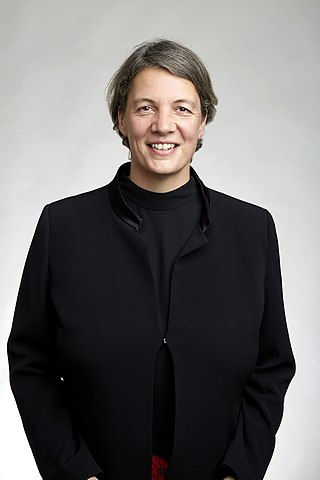
Dorothy Elizabeth Denning is a US-American information security researcher known for lattice-based access control (LBAC), intrusion detection systems (IDS), and other cyber security innovations. She published four books and over 200 articles. Inducted into the National Cyber Security Hall of Fame in 2012, she is now Emeritus Distinguished Professor of Defense Analysis, Naval Postgraduate School.

Willy Susilo is an Australian cybersecurity scientist and cryptographer. He is a Distinguished Professor at the School of Computing and Information Technology, Faculty of Engineering and Information Sciences University of Wollongong, Australia.

Alexander ‘Alex’ Zelinsky, is an Australian computer scientist, systems engineer and roboticist. His career spans innovation, science and technology, research and development, commercial start-ups and education. Professor Zelinsky is Vice-chancellor and President of the University of Newcastle joining the university in November 2018. He was the Chief Defence Scientist of Australia from March 2012 until November 2018. As Chief Defence Scientist he led defence science and technology for Australia's Department of Defence.

Michelle Yvonne Simmons is an Australian quantum physicist, recognised for her foundational contributions to the field of atomic electronics.

Tanya Mary Monro is an Australian physicist known for her work in photonics. She has been Australia's Chief Defence Scientist since 8 March 2019. Prior to that she was the Deputy Vice Chancellor, Research and Innovation (DVCR&I) at the University of South Australia. She was awarded the ARC Georgina Sweet Australian Laureate Fellowship in 2013. She was the inaugural chair of photonics, the inaugural director of the ARC Centre of Excellence for Nanoscale Biophotonics and the inaugural director of the Institute for Photonics & Advanced Sensing (IPAS), and the inaugural director of the Centre of Expertise in Photonics (CoEP) within the School of Chemistry and Physics at the University of Adelaide. Monro has remained an adjunct professor of physics at the University of Adelaide following her departure from the institution. In 2020 she was awarded the title of Emeritus Professor at the University of South Australia.
Mary Josephine O'Kane, AC an Australian scientist and engineer, is the Chair of the Independent Planning Commission of New South Wales. She is also a company director and Executive Chairman of O’Kane Associates, a Sydney-based consulting practice specialising in government reviews and research and innovation advice to governments in Europe, Asia and Australasia.

Rose Amal is an Australian chemical engineer, currently serving as Scientia Professor and ARC Laureate Fellow in the School of Chemical Engineering at the University of New South Wales, Australia, where she is the director of the Particles and Catalysis Research Group. Previously she was Director of the ARC Centre of Excellence for Functional Nanomaterials (2010–2013). From 2012 to 2015 she was named in the Engineers Australia list of Australia's Top 100 Most Influential Engineers. In 2014 she became the first female engineer elected a Fellow of the Australian Academy of Science.
Mary Jean Garson is an organic chemist and academic in Australia. She currently works for the University of Queensland.
Marcela Bilek is a Professor of Applied Physics and Surface Engineering at the University of Sydney, Australia. Her research interests focus on the use of plasma related methods to synthesise thin film materials and modify surfaces and interfaces. She was named Fellow of the American Physical Society in 2012 and Fellow of the Institute of Electrical and Electronics Engineers (IEEE) in 2015 for contributions to the science and application of plasma processes for materials modification and synthesis.
Maria Skyllas-Kazacos AM FTSE is an Australian chemical engineer best known for her pioneering work of the vanadium redox battery, which she created at the University of New South Wales in the 1980s. Her design used sulfuric acid electrolytes and was patented by the university. In 1999 she was appointed a Member of the Order of Australia "for service to science and technology, particularly in the development of the vanadium redox battery as an alternative power source".

Anicia Peters is a Namibian computer scientist specializing in human–computer interaction (HCI). She is the CEO of the National Commission of Research, Science and Technology (NCRST).

Susan Margaret Pond is an Australian scientist and technologist, active in business and academia, and recognised for her contributions to medicine, biotechnology, renewable energy and sustainability. She is the current president of the Royal Society of New South Wales.

Mary Jacquiline Romero is a quantum physicist in the Australian Research Council Centre of Excellence for Engineered Quantum Systems at the University of Queensland, Australia. Her research expertise and interests are in the field of quantum foundations and quantum information. In particular, Romero is an experimental quantum physicist studying the properties of single photons for the development of new quantum alphabets and the nature of quantum causality.

Elanor H. Huntington is Executive Director of Digital, National Facilities & Collections at the Commonwealth Scientific and Industrial Research Organisation and a Professor of Quantum Cybernetics at the Australian National University. She led a research program in the Australian Research Council Centre of Excellence for Quantum Computation and Communication Technology.
Judy Agnes Raper is an Australian chemical engineer and was previously Deputy Vice-Chancellor for Research and Innovation at the University of Wollongong. She has served as a National Science Foundation Director and led the Atomic Energy Research Establishment. She has been Dean & CEO of TEDI-London, a new engineering higher education provider since its incorporation in June, 2019.
Nan Bosler is an Australian community activist and advocate for young people, the elderly and people with disabilities. She is an author and most notable internationally for her involvement with computer clubs and digital skills for older people. Bosler was associated with Girl Guides for more than 50 years in a variety of roles.
Andrea M. Matwyshyn is an American law professor and engineering professor at The Pennsylvania State University. She is known as a scholar of technology policy, particularly as an expert at the intersection of law and computer security and for her work with government. She is credited with originating the legal and policy concept of the Internet of Bodies.
Arun Sharma is an Indian Australian computer science professor. He is a distinguished emeritus professor at the Queensland University of Technology (QUT) where he was the Deputy Vice-Chancellor for Research and Commercialisation from 2004 to 2019. He is the Council Chair of the QIMR Berghofer Medical Research Institute. Within the multinational Adani Group, he is also an Advisor to the Chairman and Group Head for Sustainability and Climate Change. He was a cofounder of Australia's National ICT Research Centre of Excellence (NICTA), and Director of the Translational Research Institute (Australia). In the course of his institutional duties, Sharma played a significant role in the development of Australian technology research capability, the promotion of translational research in agriculture and biosciences within Queensland, and the fostering of international technological research cooperation between Australia and India. Sharma's professional achievements have been recognized by awards by the Premier of Queensland, the Office of the Chief Scientist (Australia), the India Australia Business & Community Awards (IABCA), the Birla Institute of Technology & Science, and the Royal Order of Australia. He was born in the town of Banmankhi in the Indian state of Bihar.
Doreen Anne Thomas is a mathematician and electrical and mechanical engineer. She is an emeritus professor of Mechanical Engineering at Melbourne University and director of the start-up company MineOptima.
Roberto Sabatini is an Italian-Australian research engineer and academic specializing in aerospace and defense systems. Currently, he is a full professor at Khalifa University of Science and Technology (UAE) and honorary professor at RMIT University (Australia). Sabatini holds or has held visiting and consulting appointments at a number of institutions, including: Polytechnic University of Turin (Italy); Chosun University ; Durban University of Technology/Space Science Center ; the UAE Space Agency; and the Korea Aerospace Research Institute. Additionally, Sabatini is a member of the Board of Governors of the IEEE Aerospace and Electronic Systems Society (AESS), Chair of the IEEE AESS Avionics Systems Panel, and Distinguished Lecturer of the IEEE AESS










